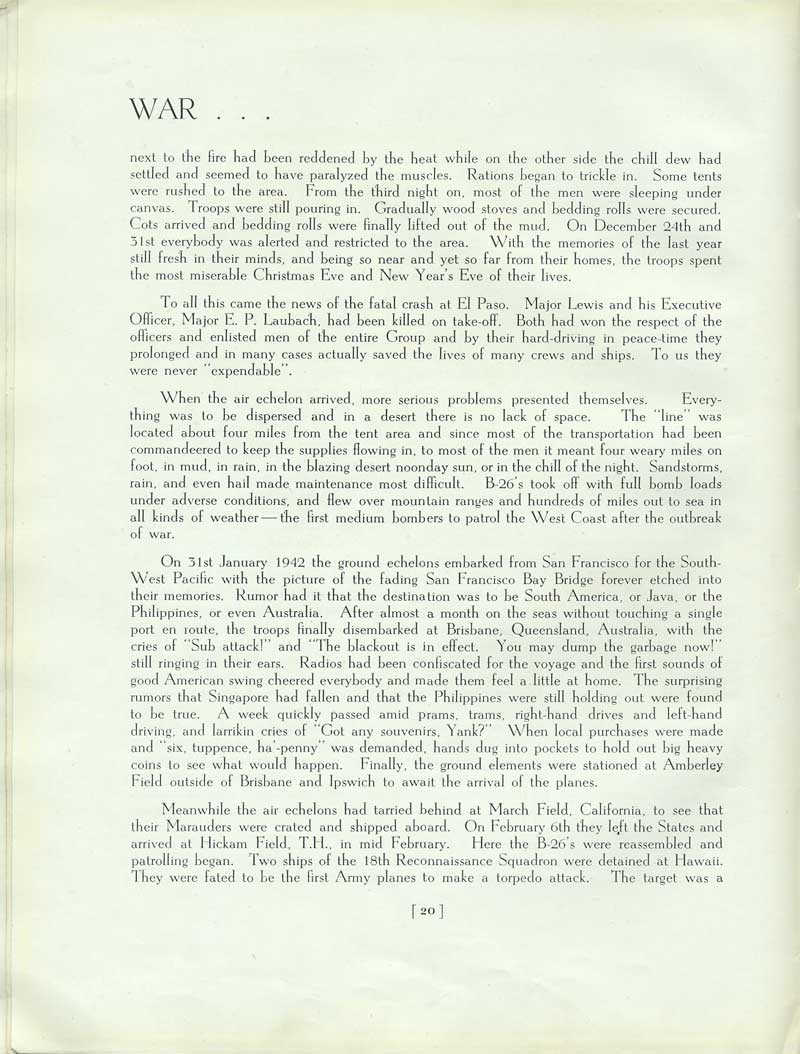
Next page...

| WAR... next to the fire had been reddened by the heat while on the other side the chill dew had settled and seemed to have paralyzed the muscles. Rations began to trickle in. Some tents were rushed to the area. From the third night on, most of the men were sleeping under canvas. Troops were still pouring in. Gradually wood stoves and bedding rolls were secured. Cots arrived and bedding rolls were finally lifted out of the mind. On December 24th and 31st everybody was alerted and restricted to the area. With the memories of the last year still fresh in their minds, and being so near and yet so far from their homes, the troops spent the most miserable Christmas Eve and New Year's Eve of their lives. To all this came the news of the fatal crash at El Paso. Major Lewis and his Executive Officer, Major E. P. Laubach, had been killed on take-off. Both had won the respect of the officers and enlisted men of the entire Group and by their hard-driving in peace-time they prolonged and in many cases actually saved the lives of many crews and ships. To us they were never "expendable". When the air echelon arrived, more serious problems presented themselves. Everything was to be dispersed and in a desert there is no lack of space. The "line" was located about four miles from the tent area and since most of the transportation had been commandeered to keep the supplies flowing in, to most of the men it meant four weary miles on foot, in mud, in rain, in the blazing desert noonday sun, or in the chill of the night. Sandstorms, rain, and even hail made maintenance most difficult. B-26's took off with full bomb loads under adverse conditions, and flew over mountain ranges and hundreds of miles out to sea in all kinds of weather-the first medium bombers to patrol the West Coast after the outbreak of war. On 31st January 1942 the ground echelons embarked from San Francisco for the South-West Pacific with the picture of the fading San Francisco Bay Bridge forever etched into their memories. Rumor bad it that the destination was to be South America, or Java, or the Philippines, or even Australia. After almost a month on the seas without touching a single port en route, the troops finally disembarked at Brisbane, Queensland, Australia, with the cries of "Sub attack!" and "The blackout is in effect. You may dump the garbage now!" still ringing in their ears. Radios had been confiscated for the voyage and the first sounds of good American swing cheered everybody and made them feel a little at home. The surprising rumors that Singapore had fallen and that the Philippines were still holding out were found to be true. A week quickly passed amid prams, trams, right-hand drives and left-hand driving, and larrikin cries of "Got any souvenirs, Yank?" When local purchases were made and "six, tuppence, ha'-penny" was demanded, hands dug into pockets to hold out big heavy coins to see what would happen. Finally, the ground elements were stationed at Amberley Field outside of Brisbane and Ipswich to await the arrival of the planes. Meanwhile the air echelons had tarried behind at March Field, California, to see that their Marauders were crated and shipped aboard. On February 6th they left the States and arrived at Hick-am Field, T.H., in mid February. Here the B-26's were reassembled and patrolling began. Two ships of the 18th Reconnaissance Squadron were detained at Hawaii. They were fated to be the first Army planes to make a torpedo attack. The target was a |